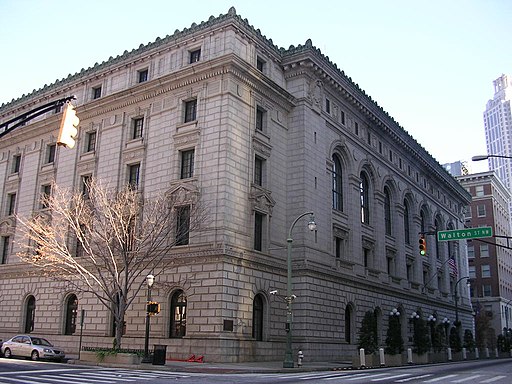Search
A federal appellate court judge is 😤steamed😤 that her colleagues won’t address gay rights at work

By Eoghanacht [Public domain], from Wikimedia Commons
The issue this case raises—whether Title VII protects gay and lesbian individuals from discrimination because their sexual preferences do not conform to their employers’ views of whom individuals of their respective genders should love—is indisputably en-banc-worthy…. I cannot explain why a majority of our Court is content to rely on the precedential equivalent of an Edsel with a missing engine, when it comes to an issue that affects so many people.
Now, let’s rewind a bit to set the stage.
In 2016, in a case called Bostock v. Clayton County, Georgia, a gay man (Bostock) sued his employer (Clayton County, Georgia) claiming that it discriminated against him based on his sexual orientation, which would violate Title VII of the Civil Rights Act of 1964.
Now, remember, while we have recent appellate court decisions from the Second Circuit (here) and Seventh Circuit (here) declaring that Title VII covers discrimination based on sexual orientation, most courts have not yet adopted this. That would include the Eleventh Circuit Court of Appeals. In Evans v. Ga. Reg’l Hosp., the Eleventh Circuit reaffirmed that “binding precedent,” a case called Blum v. Gulf Oil Corp., controlled and, thus, required dismissal of a sexual orientation discrimination claim under Title VII.
Following the Eleventh Circuit’s decision in Evans, the United States District Court for the Northern District of Georgia was tasked with ruling on Clayton County’s motion to dismiss Bostock’s complaint for failure to state a claim. In plain English, Clayton County argued that because the Eleventh Circuit had already concluded that Title VII does not cover sexual orientation, then the lower court had to apply that holding to the case before it.
And it did. Case dismissed.
But, Bostock appealed to the Eleventh Circuit. And, in May, a three-judge panel of the Eleventh Circuit (here), with its hands tied by Evans and Blum, affirmed the lower court’s decision to dismiss Bostock’s sexual orientation discrimination claim. So, Bostock asked the entire Eleventh Circuit to reconsider not only the court’s May ruling but also its prior decisions in Evans and Blum.
Yesterday, the Eleventh Circuit passed.
Enter Judge Rosenbaum and her scathing dissent.
Judge Rosenbaum concluded that the time was right for the Eleventh Circuit to reconsider its prior rulings. Here’s why:
- “A whole lot of people potentially affected by this issue.” One-quarter of employees who identify as LGBT experience workplace discrimination because their sexual preferences do not match their employers’ expectations.
- The Eleventh Circuit decided Blum ten years before the Supreme Court ruled in Price Waterhouse v. Hopkins that Title VII forbids sex stereotyping.
- “Worse still, Blum’s ‘analysis’ of the issue is as conclusory as it gets, consisting of a single sentence that, as relevant to Title VII, states in its entirety, ‘Discharge for homosexuality is not prohibited by Title VII.'”
- Plus, there’s the Eleventh Circuit’s decision in Glenn v. Brumby,, in which the court concluded that the Equal Protection Clause of the U.S. Constitution protected a transgender public-sector employee who could not be fired because of his or her gender non-conformity unless the government employer could demonstrate a “sufficiently important governmental purpose.”
Judge Rosenbaum would have concluded that Bostock had a viable “claim” for sexual orientation discrimination under Title VII. (Bostock would still have to prove that Clayton County discriminated.)
But, Judge Rosenbaum dissented for what she described as “an even more basic reason”:
[R]egardless of whatever a majority of this Court’s views may turn out to be on the substantive issue that Bostock raises, we have an obligation to, as a Court, at least subject the issue to the “crucial” “crucible of adversarial testing,” and after that trial “yield[s] insights or reveal[s] pitfalls we cannot muster guided only by our own lights,” to give a reasoned and principled explanation for our position on this issue—something we have never done. Particularly considering the amount of the public affected by this issue, the legitimacy of the law demands we explain ourselves.
And Judge Rosenbaum was just getting warmed up. Here’s the crescendo:
Despite never offering a reasoned explanation tested by the adversarial process, a majority of this Court apparently believes that Blum somehow prophesized the correct post-Price Waterhouse legal conclusion in its one-sentence “analysis” that relies solely on authority itself abrogated by Price Waterhouse. If the majority truly believes that, it should grant en banc rehearing and perform the “considerable calisthenics” to explain why gender nonconformity claims are cognizable except for when a person fails to conform to the “ultimate” gender stereotype by being attracted to the “wrong” gender. And if it doesn’t or if it believes—as I and others do—that these “calisthenics” are simply “impossible,” it should not sit idly by and leave victims of discrimination remediless by allowing Blum to continue to stand.
Although the Eleventh Circuit has passed on reconsidering its decision in Bostock, the Supreme Court may get involved. Bostock has sought certiorari. So has the defendant in the Second Circuit case that I referenced up above.
For now, however, depending on where you conduct business, your mileage may vary under federal law on whether LGBT discrimination is unlawful. That said:
- Title VII outlaws sex stereotyping and same-sex harassment;
- Many state and local laws expressly prohibit LGBT discrimination; and
- Fortunately, most companies have policies against LGBT discrimination.
 The Employer Handbook Blog
The Employer Handbook Blog


